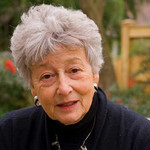Teaching Our Children When, How to Speak Out
Aug. 22, 2017
By Ruth Nemzoff
Several years ago, an African-American student at Brandeis asked me, "What was it like growing up white in America?" My response was spontaneous.
 "I wouldn’t know. I wasn't White then. They were killing my people in Europe. Here, they were banning us from entering the country. For those here, they limited our access to universities, country clubs and upscale suburbs." My student was stunned.
"I wouldn’t know. I wasn't White then. They were killing my people in Europe. Here, they were banning us from entering the country. For those here, they limited our access to universities, country clubs and upscale suburbs." My student was stunned.
Growing up in the 1940s and '50s, I was Jewish, not White. Along came the civil rights movement and then, in 1989, Black legal scholar Kimberlé Crenshaw coined the term "intersectionality" to describe overlapping or intersecting social identities and related systems of oppression, domination, or discrimination. Her essay is titled, "Demarginalizing the Intersection of Race and Sex: A Black Feminist Critique of Antidiscrimination Doctrine, Feminist Theory and Antiracist Politics."
Suddenly I was White, along with the Irish, Italians and other ethnic groups who had previously been denoted as "others." That is, until last week. In Charlottesville, Virginia, as the Neo-Nazis marched chanting, "We will not be replaced by Jews," I was no longer merely White. My identity could no longer be lumped with all the other people whose skin are various shades of white.
In many ways, I do benefit from the color of my skin. From the less important like getting served versus overlooked at coffee bars, to the most terrifying — neither my children nor I worry about getting pulled over and murdered by police for no reason. Because I am White, there are many cases my where competence is assumed, but still others where the opposite is true simply because I am a woman. For example, people assume I like cooking when I don't. Conversely, I have earned less than male colleagues. When I ran for the New Hampshire state legislature, I was accused of being a bad parent. My male colleagues were not.
I recognize that the intersection of my white skin, my gender and my Jewishness is lost to others but not to me. Identity is both what we think of ourselves as well as what others think of us. I feel a kinship with the poor white male who can't get a job, does not have enough money, but is told he's privileged. He does not feel advantaged. Having come to consciousness when Jews were terrorized, I can never be without fear. Underlying my financial and educational privilege is a subconsciousness that always reminds me to be wary.
My concern now is for the next generation of Jews — particularly those who are currently attending colleges. The alt-right/Nazi protests in Charlottesville, with their terrifying chant, have rekindled my fears. Some believed that anti-Semitism was a figment of the Jewish imagination or a persecution complex or even a remnant of the past. Sadly, Charlottesville showed us that it is in fact alive and well here in the United States. Even scarier, our president and many of our elected leaders are unwilling to condemn it.
So what do we do? As parents and grandparents, as mothers and grandmothers, it is our obligation to educate ourselves about the happenings on college campuses. When is intersectionality used as a blunt instrument rather than a tool for understanding? How do we admit our privilege while still helping others to acknowledge our precariousness. We must educate ourselves and then our children to respond to untruths and more importantly, to half-truths.
One of our obligations as Jewish women is to prepare our children for their place as Jews in society. Today's campuses have both anti-Semitism and anti-Zionism. Sometimes it's hard to tell the difference. Do we and our children know Jewish history? Do they know how to respond?
Our democratic obligation is to both love and criticize our government. It may be that we need to do this for Israel also. How do we prepare our children for the "whose oppression is worse" discussions raging on campus? How do we prepare them and ourselves to move the conversation into constructive actions for all oppressions?
How do we help our children both acknowledge some of the privileges they have as one demographic and the fear they have because of another? How do we help others understand that the well founded fears of one group are not more valid than the well founded fears of another?
We all know the quote from Pastor Martin Niemoller:
“First they came for the Socialists and I did not speak out — because I was not a Socialist.
"Then they came for the Trade Unionists, and I did not speak out — because I was not a Trade Unionist.
"Then they came for the Jews, and I did not speak out — because I was not a Jew.
"Then they came for me — and there was no one left to speak for me.”
Do we know how to speak out? Do our children?
 Ruth Nemzoff, PhD, is a resident scholar at the Women’s Studies Research Center, Brandeis University and author of "Don’t Bite Your Tongue: How to Foster Rewarding Relationships with Your Adult Children" and "Don’t Roll Your Eyes: Making In-Laws Into Family." She is the former assistant minority leader, New Hampshire House of Representatives.
Ruth Nemzoff, PhD, is a resident scholar at the Women’s Studies Research Center, Brandeis University and author of "Don’t Bite Your Tongue: How to Foster Rewarding Relationships with Your Adult Children" and "Don’t Roll Your Eyes: Making In-Laws Into Family." She is the former assistant minority leader, New Hampshire House of Representatives.